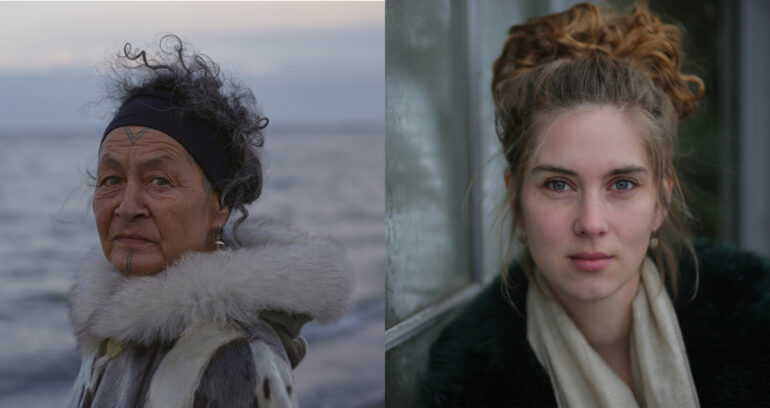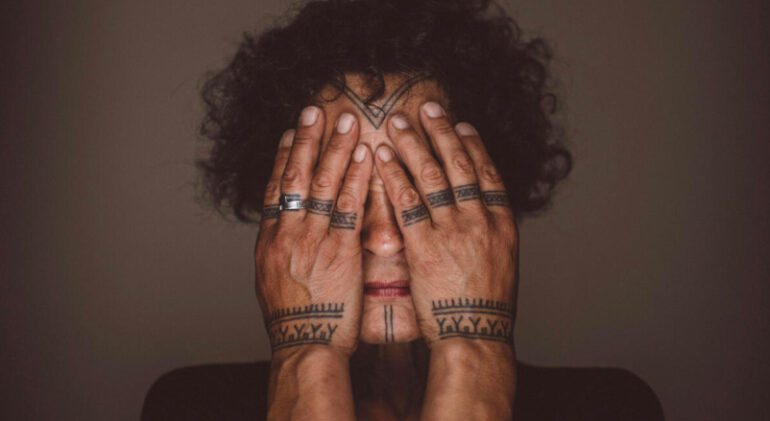WRITTEN BY: Marta Balaga
Director/writer Lin Alluna and co-writer Aaju Peter discuss their empowering Greenlandic doc Twice Colonized.
Twice Colonized, one of the two documentaries nominated for the Nordic Council Film Prize 2024 this year, follows Inuit activist Aaju Peter as she fights for her culture, but also for herself. Director Lin Alluna – who wrote the script with Peter – combines the personal with the political, as Aaju reveals her once most painful secrets. She has been colonised twice, first by Danish settlers in Greenland and then in Canada, but she’s not done fighting just yet. In fact, she is just warming up.
The film, produced by Emile Hertling Péronard, co-produced by Alethea Arnaquq-Baril, Stacey Aglok Macdonald and Bob Moore, premiered at Sundance. It’s a co-production between Canada, Denmark and Greenland, and is representing Greenland in this competition.
When you are making a film like this one, what’s the biggest struggle? Moving away from the idea you have to be “polite” and not offend anyone?
Lin Alluna: I know exactly what you mean. We were definitely confronted with it.
Aaju Peter: When COVID happened, life was so normal for us indigenous people, because we were already familiar with that anxiety and hardship. It was the others, the white people, who suddenly had to deal with discomfort. We? We struggle every step of the way. You could say that we live in another reality. Our train runs on completely different tracks.
LA: Right from the beginning, we knew it couldn’t be just about her successes. You see Aaju on stage, but there are all these other things she’s carrying with her. At the very beginning, when I was pitching my idea to the founders, they only wanted to see the spotlight. They wanted a “clean hero”, if that makes sense. I met people who asked me: “Why is she so angry all the time?” There is energy in anger and there is a reason for it. To me, a true hero is someone who goes through hardships and is still fighting for change. Showing both these sides was essential.
There should be a law preventing people from calling women “angry”. There is rage in this documentary, it’s true. Aaju, it feels like you don’t have time for small talk anymore?
AP: There was a time when I was trying to be polite. I was trying to educate others. I am so tired of it now. They can find out about our history, find out why we are so hurt. They can Google it all. Now, it’s up to them to learn more.
LA: And to take action. It’s something we talked about a lot: “What does this film need to do?” We want to look at the past and the ongoing effects of colonisation. We don’t want to shy away from the darkness, but we also want to inspire people. Here, in the Nordic countries, we are a bit behind when it comes to indigenous issues and recognising colonisation. We have to take steps towards a better future.
AP: I think we are at a point of transition. Growing up, I had to speak Danish and follow what white people were saying. They were “The Gods”. Now, we are realising we can be different. I really don’t have to be a white person! I still remember how shocked I felt when I understood, for the very first time, that I can actually express myself. It was really empowering.
It’s a story about empowerment: empowerment of the indigenous people, but also your own. How did you want to show this in your film?
AP: This crew was very open-minded. It’s true – you guys were amazing! Everyone said Lin was very respectful. Also, in Canada, we are taking these first steps towards reconciling. “Ok, all this shit happened, so how do we move forward?” How do we do it respectfully? That’s the Inuit way. We don’t shout, no matter how much pain we are going through.
LA: These conversations are necessary for our evolution, but we can’t have them unless there’s trust. And trust is not something you can just ask for. I had to show Aaju trust, and then she could choose if she wanted to return it or not.
AP: People asked: “How can you trust her filming you this way?” She didn’t tell me that some of them questioned if Lin, as a white person, as a Dane, should be doing it. When I found out, I said: “Oh, people are still trying to control my choices.” Because this was my choice. All my life, someone has been dictating my every move.
LA: We need each other to open each other’s eyes. When we were filming very personal scenes, I kept putting the camera away. And she was telling me to continue!
AP: It was about accepting all the shit and all the joys, and capturing it. I met people who were taken away when they were young, just like me, and planted in a completely different environment. They suffered a complete blackout – for the longest time, I thought I was the only one. It wasn’t about having a bad memory. It was too much to bear.
You aren’t claiming that everything is resolved right now. Could the message be: You are not done?
LA: We also want to inspire hope. It couldn’t be a downer. We don’t want to kill hope, we want to empower people. There are things we can do.
AP: That’s why I asked the crew to come back when my students were graduating. They proved that you can lose your own language, the Inuit language, but you can also take it back and teach the next generation. I always say: “Everyone should ice-hop.” You learn to survive. We ice-hopped, and we made it. Life is tough, so get on with it.
What has the response been to different themes in the film?
LA: The idea was for this film to be personal and then push something political. By touching people, you can make a change in society. We get messages from those who dealt with colonisation, but also unhappy relationships, sorrow and loss. Or those who fight for something political and recognise Aaju’s sacrifices.
AP: There are also those who say: “I had no idea.” We get that a lot. You have to write this: The worst question anyone can ask me is this one: “Why don’t you just…?” “Why don’t they just get an education, a job?” That signals they don’t have any idea about our reality. We inherit all this trauma. As indigenous women, we have to be twice as good to be on the same level as everyone else. Hopefully, for my grandchildren, it will be much easier.
LA: I think that’s the most beautiful thing, when people come up and say: “I didn’t realise. Thank you for opening my eyes.” That’s the first step. When we were showing the film in the Nordic countries, it really resonated with the audiences. The hope is that it can be an eye-opener, because listening is something we really have to learn.
This connects to the impact important for stories like yours to be widely seen and nominated for awards?
AP: I think it all happened at the right time. In the Inuit language, we don’t even have a word for colonisation. Yet every cell of me was colonised, every single thought. Everything was penetrated by that outside influence. Luckily, we get proficient at talking about it: It’s not a dirty word anymore. We can talk about colonisers and those who were colonised. I think with Lin, we are a perfect example of that.
Official trailer:
The documentary will be screened at Helsinki International Film Festival and NCFP events in Copenhagen, Stockholm and Reykjavík. To read more about Twice Colonized: CLICK HERE.
The Film Prize was first awarded in 2002 and then permanently established in 2005, and is to be juxtaposed with the Nordic Council Literature Prize, the Children & Young People's Literature Prize, the Music Prize, and the Environment Prize. The winner of the prizes will be announced October 22 via RÚV.

